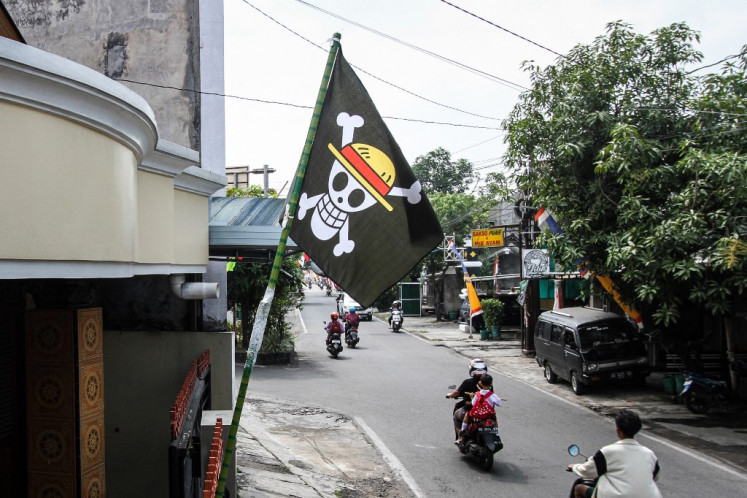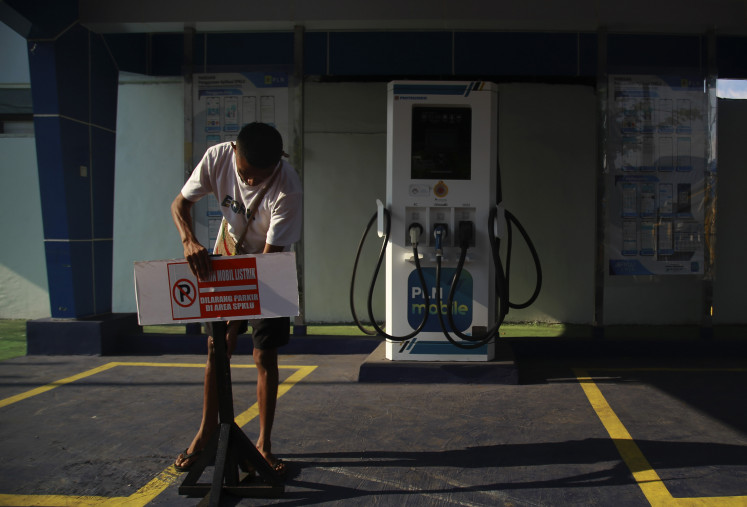Popular Reads
Top Results
Can't find what you're looking for?
View all search resultsPopular Reads
Top Results
Can't find what you're looking for?
View all search resultsCommuter line operator increases rolling stock, raises fares
Ahead of the planned Oct
Change text size
Gift Premium Articles
to Anyone
A
head of the planned Oct. 1 fare increase by Rp 2,000 (20 US cents) for all air-conditioned commuter trains, railway company PT KAI Commuter Jabodetabek (KCJ) will improve services by adding trains as well as building and renovating stations, according the company.
KCJ spokesman Makmur Syaheran said on Monday that the company had already purchased 60 Tokyo Metro Series 6000 electric railway cars, of which 20 had arrived at the Tanjung Priok port in North Jakarta on Monday. The new arrivals will join the company’s current fleet of 664 cars.
The 20 cars, costing Rp 1 billion each, would be assembled at the Pasoso station in the port and made operational at the Balai Yasa depot in Manggarai, South Jakarta, he said.
“The other 40 cars will arrive by the end of October,” Makmur said. “Next year, we will buy another 160 cars.” By 2019, he added, the company aimed to have 1,440 cars, capable of carrying 1.2 million passengers per day, three times the current capacity of 400,000 passengers.
According to Makmur, the company also plans to build five new stations in Mampang, Roxy, Matraman, Bandengan and Kebon Pedes, renovate six stations in Jurangmangu, Rawabuntu, Juanda, Cikini, Gondangdia and Duri, as well as reactivate three former stations in Mampang Baru, Grogol and Tanah Tinggi.
Other plans include the construction of four electrical substations in Manggarai, Kuningan, Rajawali and Kramat, as well as stabling points in Parung Panjang, Bogor and Kampung Bandan. Moreover, KCJ would provide wheelchairs in each station to better serve the disabled, said Makmur.
To fund the improvement plans, the company would raise its fares by Rp 2,000 across the board on Oct. 1, he said. “All of the money to be reaped from the price increase will be used to improve our services,” Makmur said.
He said that the company had conducted surveys, in cooperation with the Institute for Management at the University of Indonesia’s School of Economics (LM-FEUI), to measure the public’s willingness and ability to pay for the increased ticket prices. According to the survey, conducted from July to August 2012, the price increase was acceptable by the public.
While commuters are willing to pay the extra fares, they also demand improvements in the commuter-line services. Sutini, a 53-year-old nurse at Cipto Mangunkusumo Hospital in Salemba, Central Jakarta, for example, said that she did not mind the price increase as long as the company added more trains.
“That’s my number one complaint. All the trains bound for Manggarai are always jam-packed,” she said. “I never get a seat whenever I take a train from my house in Tanjung Barat and youngsters never offer me one.
I take that as a compliment as they consider me still young.”
Despite her complaint, Sutini said, she would still use the train services to avoid crippling traffic jams and pollution.
Marta Rina, 34, a resident of Depok, also demanded better services, saying that air conditioners in some of the trains often did not work.
“What’s the point of the price increase if they can’t even maintain the air conditioning?” she asked, on a train from Juanda to Bogor, the air conditioner of which was leaking.
While Jakartans accepted the price increase, Depok Mayor Nur Mahmudi Ismail said that the commuter-line operator should better cooperate with regional administrations in the outskirts of Jakarta to improve the services.
“If the company doesn’t have enough funds to improve the services and expand the fleet, then why not ask local administrations for help,” he said, adding that he was currently studying the feasibility of cooperation.
If such cooperation was not viable, the Depok administration was ready to subsidize Depok residents using the train services, said Nur. (han)










